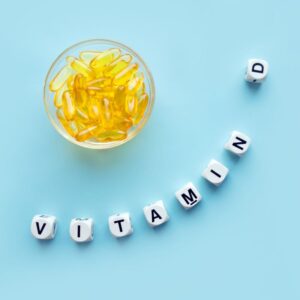The Importance of Vitamin D
September 2, 2023
by Romana Brennan, MS, RD
 The Importance of Vitamin D — What is Vitamin D?
The Importance of Vitamin D — What is Vitamin D?
Vitamin D is a fat-soluble vitamin that also acts in the body as a hormone by regulating a variety of essential pathways. It’s also known as “the sunshine vitamin” because our bodies produce it in response to sunlight.
The Role of Vitamin D
Vitamin D notably helps build and maintain strong bones by aiding with calcium absorption, helping to prevent osteoporosis. It also helps regulate cells responsible for immune functions. Vitamin D is converted in the body into a steroid hormone capable of turning genes on or off, signaling them to make enzymes and proteins crucial to maintaining health and fighting disease. Adequate amounts of vitamin D are also linked to improved heart health and glucose metabolism.
 Vitamin D Deficiency
Vitamin D Deficiency
It’s estimated that roughly 30% of the US population is vitamin D deficient. While an individual’s optimal serum concentration of 25(OH)D (a measurement of vitamin D status) may vary given a variety of factors, the functional optimal range may be anywhere from 40-80 ng/mL, with a general target of 50 ng/mL (1). Because vitamin D impacts a wide variety of body systems, symptoms of vitamin D deficiency can also vary, and may include:
- Fatigue
- Decreased immune response or frequent illness
- Muscle pain and weakness
- Bone and joint pain
- Mood disturbances
- Increased migraines
- Increased allergies
- Hormonal disruption
- Reduced fertility
- … and more!
 Sources of Vitamin D
Sources of Vitamin D
As mentioned, our bodies have the ability to synthesize vitamin D from sunlight. For optimal vitamin D synthesis from sun exposure, it is recommended to spend at least 15-20 minutes outside between the hours of 10 a.m. and 2 p.m. During the winter months, however, latitude strongly determines the strength of UV light. At latitudes above 37 degrees N (here in California that is anywhere north of San Jose), vitamin D synthesis from sunlight likely is not an adequate source of vitamin D (2, 3). Exposure is also impacted by cloud cover, time of day, sunscreen usage, air pollution, and skin tone. It’s important to note that everyone synthesizes vitamin D differently based on their genetics, so it is worth considering other sources of vitamin D, especially given the known benefits of applying sunscreen daily to protect the skin and prevent signs of premature skin aging.
Unfortunately, there are few food sources that naturally contain vitamin D. However, we do find some vitamin D in fatty fish (ex. salmon, trout, tuna, and mackerel), fish liver oils, beef liver, egg yolks, mushrooms, as well as fortified dairy and soy milk.
 Vitamin D Supplementation
Vitamin D Supplementation
Vitamin D is also available in supplement form and is found as either vitamin D2 or vitamin D3. Vitamin D3, derived from an animal source, has been shown to be more potent than plant-derived vitamin D2. Vitamin D2 may be the preferred option for individuals with chronic kidney disease.
Vitamin D is available in supplement form and is best taken with Vitamin K2. Vitamins D and K share similar qualities, but they act synergistically with one another within the body to ensure that the calcium absorbed from the GI tract is utilized to strengthen bones as opposed to being deposited in the arteries, which can pose a risk to the cardiovascular system.
 The Importance of Vitamin D
The Importance of Vitamin D
Vitamin D3 is often recommended in doses ranging from 1000 IU to 10,000 IU, depending on your current serum vitamin D levels and health status. Because vitamin D is fat-soluble, it’s important to take it with a fat source for optimal absorption. Given the nature of being fat-soluble, vitamin D in excess is stored in the body rather than excreted in the urine like water-soluble vitamins. Too much vitamin D can lead to a condition called hypercalcemia, so it’s essential to consult with your doctor or dietitian to ensure you are supplementing appropriately.
At PPMA, we ensure all health recommendations are tailored to you. Be sure to speak with a doctor or dietitian to determine if you may benefit from supplementing with vitamin D, as well as your optimal individualized dosage. You can also ask your doctor about assessing your vitamin D status.
 Romana Brennan, MS, RD, is a Dietitian Nutritionist at PPMA and is board-certified by the Commission on Dietetic Registration as a Registered Dietitian Nutritionist. Romana received her Bachelor’s Degree in Integrative Biology, with a minor in Spanish from the University of California, Berkeley. She holds her Master’s Degree in Nutrition, Healthspan, and Longevity from the University of Southern California. Here she also completed her dietetic supervised practice, training under Registered Dietitians in a variety of inpatient, outpatient, community, research, and private practice settings.
Romana Brennan, MS, RD, is a Dietitian Nutritionist at PPMA and is board-certified by the Commission on Dietetic Registration as a Registered Dietitian Nutritionist. Romana received her Bachelor’s Degree in Integrative Biology, with a minor in Spanish from the University of California, Berkeley. She holds her Master’s Degree in Nutrition, Healthspan, and Longevity from the University of Southern California. Here she also completed her dietetic supervised practice, training under Registered Dietitians in a variety of inpatient, outpatient, community, research, and private practice settings.
Schedule a FREE consultation with a nutritionist today!
Call (949) 566-8179 or contact us.


 The Importance of Vitamin D — What is Vitamin D?
The Importance of Vitamin D — What is Vitamin D? Vitamin D Deficiency
Vitamin D Deficiency Sources of Vitamin D
Sources of Vitamin D Vitamin D Supplementation
Vitamin D Supplementation The Importance of Vitamin D
The Importance of Vitamin D